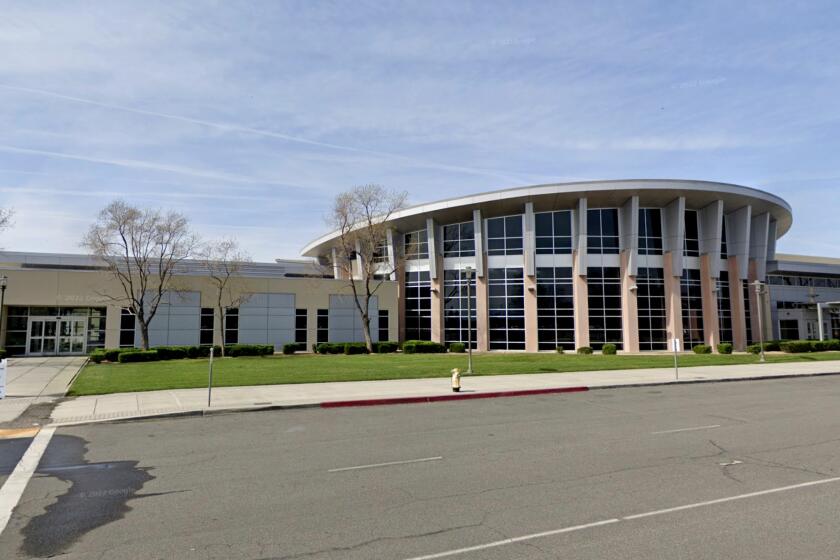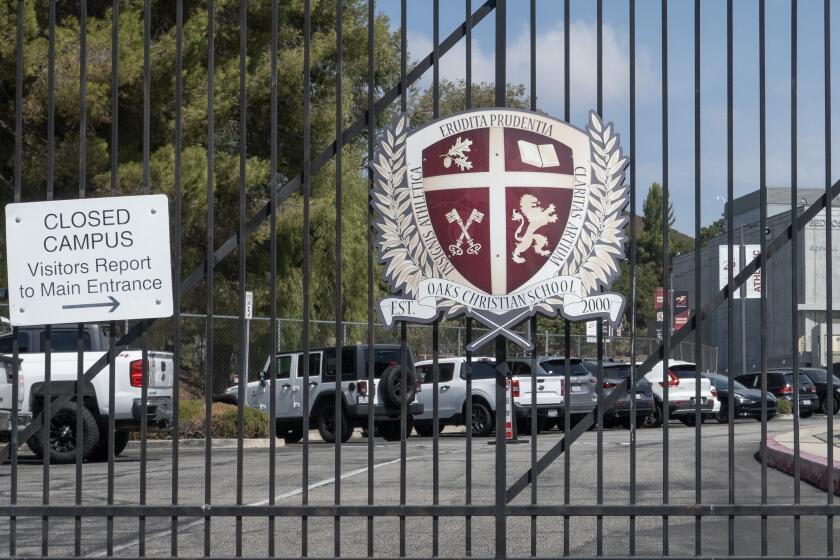March Base Cargo Hub Likely
Riverside County officials are poised to approve a controversial, round-the-clock air cargo hub at March Air Reserve Base today, the latest battle in Southern California pitting backers of expanded commerce against residents concerned about noise and air pollution.
Supporters say the vote, which could lure shipping firm DHL as a prime tenant, is a vital step toward keeping the military base open and bringing the bulk of the Southland’s booming air cargo operations to the Inland Empire and desert areas by 2030.
However, neighborhood activists and environmentalists strongly oppose the proposal, saying the flights would affect thousands of residents under or near the flight path, and further worsen the Inland Empire’s already bad air quality.
Similar battles have dogged expansion of the seaports of Long Beach and Los Angeles in the past year. Community opposition also scuttled plans to turn the El Toro Marine base in Orange County into a commercial airport.
Converting March into an air cargo hub is a “key piece of the larger puzzle” of accommodating the increasing amount of air cargo coming into the region, said Jeff Lustgarten, a spokesman for the Southern California Assn. of Governments, a leading regional planning agency
The association has long promoted the development of a regional airport system, and estimates that a new global “cargo port” at March could handle 1.1 million pounds annually, making it third in the region after Los Angeles and Ontario airports.
LAX would stay largely stable with 2.34 million tons of cargo anticipated by 2030, up from slightly more than 2 million tons this year. Airports at Ontario, March, Palmdale and the former Norton and George military bases in San Bernardino and Victorville respectively would handle a combined 6 million tons annually, Lustgarten said, of a projected 8.2 million total tons.
“In Southern California, a huge part of our economy relies on trades and commerce,” he said. “We’re estimating air cargo in the region is going to triple between now and 2030.”
Long Beach port commissioners approved a 115-acre expansion plan last month even though air quality regulators warned them that their environmental reviews underestimated how much air pollution would be generated.
Long Beach-area residents complained about the proposed port expansion after the release of a USC study earlier this month documenting loss of lung function in children in six cities with dirty air.
The air cargo proposal at March, to be voted on tonight by the March Joint Powers Authority, includes a 380,000-square-foot warehouse and would at first allow 20 commercial flights daily, including 11 at night. That number could rise sharply in coming years.
The proposal is strongly supported by business groups and local politicians, who see it as a major boost to the job-poor Inland Empire economy.
“There was a 12% unemployment rate in my district when I was first elected [in 1992], and it went up even more as March converted,” said U.S. Rep. Ken Calvert (R-Riverside).
The former Air Force base was downsized to a reserve base in 1996, and now has a dual public-private mission to bring in commercial revenues to help offset operating costs for the Department of Defense.
The base has been the departure point for 80,000 soldiers shipped to Iraq thus far.
Calvert, who sits on congressional committees overseeing base closures, said it could be targeted again next year.
Residents in adjacent new, upscale developments say the commercial operations will further pollute the air and destroy their quality of life.
“Jet pollutants cause asthma, lung damage, heart disease, cancer and death ... you don’t have to live right under the flight path to be impacted, the poison circle can extend six nautical miles and continue 20 miles downwind,” said Catherine Barrett-Fischer, leader of a community environmental group opposed to overnight commercial flights at the base.
Barrett-Fischer, who bought her home near the base five years ago, said she never would have purchased a home there if she knew about plans for such flights. She said she was only told about existing, military reserve operations.
She said her group had changed its initial position of being totally opposed to commercial flights, recognizing that such business could help keep the base open. She said the group now only wants an existing military “good neighbor” curfew, banning nonessential flights from 11 p.m. to 7 a.m. She said her group would sue if necessary over what they feel are inadequate, outdated environmental studies for the project. Last year, the group settled a lawsuit against the March Joint Powers Authority over a proposed business park, forcing the authority to cut by half the number of planned warehouses and diesel trucks.
Phil Rizzo, head of the March Joint Powers Authority, said there is no military curfew on nighttime flights. Rizzo said there was a voluntary “good neighbor” policy under which the Air Force did its noisiest training during the day, but noted that troop transport flights had been taking off at night regularly.
Numerous calls to DHL seeking comment were not returned.
Earlier this year the company announced a $1.2-billion expansion in North America, aimed at becoming more competitive with UPS and Federal Express. The company, which is owned by Brussels-based Deutsche Post Euro Express, with corporate offices in Plantation, Fla., is planning seven regional sorting centers across the U.S.
Calvert said DHL executives had told them they were trying to decide between March, Ontario International Airport and San Bernardino International Airport, formerly Norton Air Force Base.
Riverside County Supervisor Bob Buster, who sits on the commission and represents residents who live under the flight path, said there were no guarantees that DHL would pick March over the other two airports even if it receives overnight flight approvals.
“DHL, they’re obviously in the catbird seat. They can play off one community against the other,” said Buster, who said he could end up being the lone hold-out on the eight-member panel in approving the zone changes and night flights.
“That’s not a wise position, to ... prostrate ourselves before a multibillion-dollar business.”
Tonight’s public hearing, at 6:30 p.m. at the Riverside Convention Center, is expected to draw hundreds of people.
More to Read
Sign up for Essential California
The most important California stories and recommendations in your inbox every morning.
You may occasionally receive promotional content from the Los Angeles Times.









